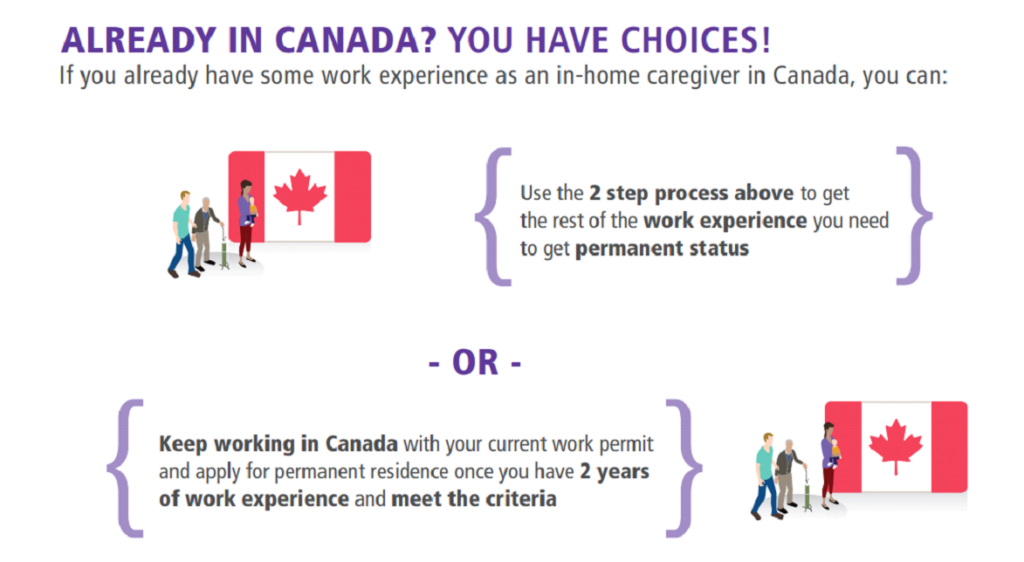Caregiver Pathway
Caregivers play a vital and crucial role in Canada’s economy and society, particularly due to the nation’s ageing population and low birth rate. To meet the growing demand for caregivers, Canada has established various immigration and work permit pathways. With a commitment to modernizing its immigration policies, Canada has recently revamped its caregiver pathways for permanent residence, introducing two pilot programs to provide opportunities for caregivers to obtain both temporary work permits and permanent residency.
This pathway welcomes a maximum of 5,500 principal applicants each year, allowing caregivers to embark on a new chapter in their lives.
An exciting development effective April 30, 2023, is the reduction of required work experience in Canada from 24 months to 12 months.
This change not only simplifies the process but also benefits those caregivers who have already applied

Home Child Care Provider and Home Support Worker
The Home Child Care Provider Pilot and Home Support Worker Pilot provide an opportunity for caregivers to obtain permanent residency if they meet certain requirements. These criteria include:
- Having a minimum of 12 months of full-time qualifying work experience within the 36 months before applying.
- Achieving a Canadian Language Benchmark (CLB) of 5 in language tests.
- Completing one year of Canadian post-secondary education or its international equivalent.
- Successfully passing an admissibility check for health, criminality, and security.
Qualifying Work Experience for Permanent Residence in Canada for Caregivers
The Immigration, Refugees and Citizenship Canada (IRCC) has set specific criteria for work experience for those applying to the pilot programs. As of April 30, 2023, applicants must have a minimum of 12 months of full-time work experience within the 36 months prior to applying for the pilot program. This work experience must fall under the National Occupational Classification (NOC) codes 4411 or 4412.
For the Home Child Care Provider Pilot, caregivers with work experience in NOC 4411 (excluding foster parents) may be eligible for permanent residence. The caregiver must:
- Have cared for children under the age of 18 either in their own home or their employer’s home.
- It is not necessary to live in the employer’s home to be eligible.
- Work experience as a foster parent does not count.
Similarly, caregivers with work experience in NOC 4412 (excluding housekeepers) may be eligible for permanent residence through the Home Support Worker Pilot. The caregiver must:
- Have provided care to someone in need of assistance as a home support worker, whether it was in your own home or your employer’s, you are eligible.
- Living in your employer’s home is not a requirement for eligibility.
- Only those working as home support workers under NOC 4412 are eligible, and experience as a housekeeper does not qualify.
Language Requirements
To qualify, you must take an English or French language test that is recognized by IRCC and achieve a score of at least CLB or NCLC 5 in all four language skills: writing, reading, listening, and speaking.
Educational Qualifications
To be eligible, you should have completed a post-secondary educational program that lasts for at least one year. This program can be from either a Canadian institution or a foreign one. If you have a foreign education, you will also need to obtain an Educational Credential Assessment (ECA).
Meeting Admissibility Criteria
IRCC conducts checks to ensure that new immigrants do not pose any health or safety risks to Canadians. The required documents for each applicant vary based on their individual backgrounds. IRCC outlines these requirements in their application guide. Depending on your background, you might need to submit:
- Biometrics
- Medical examination results
- Police clearance certificate
Find out if you are eligible to get in Canada →
Pathways to Obtain a Work Permit for Caregivers in Canada
If you are considering applying for the Home Child Care Provider Pilot or Home Support Worker Pilot, you may be eligible to obtain a work permit.
Open Work Permits for Home Child Care Providers and Home Support Worker Pilots
The Immigration, Refugees, and Citizenship Canada (IRCC) has categorized applicants of these pilots into two groups based on their Canadian work experience in NOC 4411 or NOC 4412.
Category A (0-23 months of eligible Canadian work experience): If you have less than 12 months of experience in NOC 4411 or NOC 4412 in Canada, you need to apply for an occupation-restricted open work permit when submitting your permanent residence application under either pilot. Once you meet the permanent residence criteria, you will receive a work permit for NOC 4411 or NOC 4412. This permit allows you to come to Canada as a temporary resident and gain 12 months of work experience within three years, starting from the issuance date of the work permit.
Category B (12 months of eligible Canadian work experience): If you have completed 12 months of work experience in either NOC 4411 or NOC 4412, you do not need to apply for an occupation-restricted open work permit during your permanent residence application. You are eligible to apply for a Bridging Open Work Permit (BOWP) after submitting your immigration application. However, the BOWP application will only be processed once IRCC evaluates your eligibility for permanent residence.
Furthermore, your spouse and dependents can also benefit from this opportunity by joining you in Canada and obtaining open work permits for themselves. This allows your family to be together and contribute to the workforce while you pursue your career path in Canada.
The In-Home Caregivers Temporary Foreign Worker Program (TFWP) Stream
This stream allows families to hire foreign caregivers to assist with the care of children, seniors, or individuals with certified medical needs when there are no available Canadians or permanent residents for the job. The caregiver must provide full-time care (a minimum of 30 hours per week) within the private household where the care is needed.
Foreign caregivers can assist children under 18 years old in roles like NOC 4411, seniors aged 65 and over, and individuals with disabilities or serious illnesses in positions such as NOC 3012, NOC 3233, and NOC 4412.
To participate in the program, families must submit a Labour Market Impact Assessment (LMIA) application to the Canadian government for approval. Once approved, the foreign caregiver can apply for a work permit from Immigration, Refugees, and Citizenship Canada (IRCC).
However, it’s important to note that work permits for caregivers in NOC 4411 and 4412 will only be issued under specific conditions:
- Caregivers working in any province or territory except Quebec must already be residing in Canada for IRCC to process their work permit. Work permits will not be processed for those living overseas.
- Caregivers working in Quebec have the option to reside in Quebec or overseas. As long as they meet the eligibility criteria, IRCC will process their work permit.
In conclusion, the In-Home Caregivers TFWP Stream provides a way for families to hire foreign caregivers when no Canadians or permanent residents are available. Caregivers can assist with various age groups and medical needs, but specific conditions must be met for work permits depending on the province or territory.
How do the new Caregiver Pathway work?


Home child care provider pilot update 2024
- The new pilots, Home Child Care Provider and Home Support Worker, will each have a maximum of 2,750 principal applicants, for 5,500 principal applicants per year, plus their immediate family.
- Initial applications to the new pilots will have a 12-month processing service standard.
